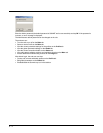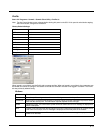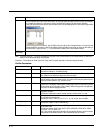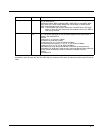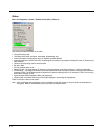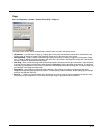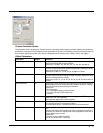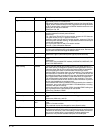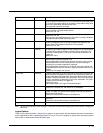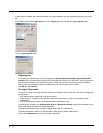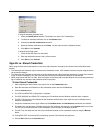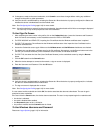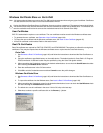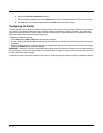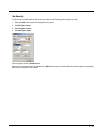
6 - 12
Aggressive Scan On When set to On and the current connection to an AP weakens, the radio
aggressively scans for available APs.
Aggressive scanning works with standard scanning (set through Roam
Trigger, Roam Delta and Roam Period). Aggressive scanning should be
set to On unless there is significant co-channel interference due to over-
lapping APs on the same channel.
Options are: On, Off
CCX or CCX Features Optimized Use of Cisco Compatible Extensions (CCX) radio management and AP
specified maximum transmit power features.
Options are:
Full - Use Cisco IE and CCX version number, support all CCX features.
The option known as “On” in previous versions.
Optimized –Use Cisco IE and CCX version number, support all CCX fea-
tures except AP assisted roaming, AP specified maximum transmit pow-
er and radio management.
Off - Do not use Cisco IE and CCX version number.
Cisco IE = Cisco Information Element.
WMM On Use of Wi-Fi Multimedia extensions.
Devices running Windows XP can change the default value. Devices run-
ning all other OS cannot change the default value.
Auth Server Type 1 Specifies the type of authentication server.
Options are: Type 1 (ACS server) and Type 2 (non-ACS server)
TTLS Inner Method Auto-EAP Authentication method used within the secure tunnel created by EAP-
TTLS.
Options are:
AUTO-EAP (Any available EAP method), MSCHAPV2, MSCHAP, PAP
CHAP, EAP-MSCHAPV2
PMK Caching Standard Type of Pairwise Master Key (PMK) caching to use when WPA2 is in
use. PMK caching is designed to speed up roaming between APs by al-
lowing the client and the AP to cache the results of 802.1X authentica-
tions, eliminating the need to communicate with the ACS server.
Standard PMK is used when there are no controllers. The reauthentica-
tion information is cached on the original AP. The client and the AP use
the cached information to perform the four-way handshake to exchange
keys. Opportunistic PMK (OPMK) is used when there are controllers.
The reauthentication information cached on the controllers. The client
and the controller behind the AP use the cached information to perform
the four-way handshake to exchange keys.
If the selected PMK caching method is not supported by the network in-
frastructure, every roam requires full 802.11X authentication, including
interaction with the ACS server.
If the active profile is using WPA2 CCKM, the global PMK Caching set-
ting is ignored and the client attempts to use CCKM.
Options are: Standard, OPMK
WAPI Off Default is Off and dimmed (cannot be changed).
TX Diversity On How to handle antenna diversity when transmitting packets to the Access
Point.
Options are: Main only, and On.
RX Diversity On Start on
Main
How to handle antenna diversity when receiving packets from the Access
Point.
Option is: On-start on Main
This parameter cannot be changed for some Summit radios.
Frag Thresh 2346 If the packet size (in bytes) exceeds the specified number of bytes set in
the fragment threshold, the packet is fragmented (sent as several pieces
instead of as one block). Use a low setting in areas where communica-
tion is poor or where there is a great deal of wireless interference.
Options are: Any number between 256 bytes and 2346 bytes.
Parameter Default Function



